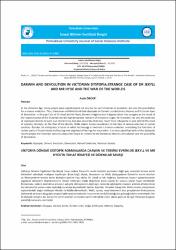DARWIN AND DEVOLUTION IN VICTORIAN DYSTOPIA:STRANGE CASE OF DR JEKYLL AND MR HYDE AND THE WAR OF THE WORLDS
Citation
ÖNDER, A. (2019). DARWIN AND DEVOLUTION IN VICTORIAN DYSTOPIA: STRANGE CASE OF DR JEKYLL AND MR HYDE AND THE WAR OF THE WORLDS. Pamukkale Üniversitesi Sosyal Bilimler Enstitüsü Dergisi, (37), 33-42.Abstract
In the Victorian Age, many people were apprehended not only by Dar win’s theories of evolution, but also the possibilities
for a reverse evolution. Thus, Stevenson and Wells build their dystopias on Darwin’s evolutionary theories and Victorian fears
of devolution. In Strange Case of Dr Jekyll and Mr Hyde, Stevens imagines man’s degeneration into savagery as the result of
the repressiveness of the Victorian morals that demanded restraint of instinctive urges. He illustrates not only the potential
of repressed desires to burst out into ferocity, but also perversity that may result from indulgence in vice behind the mask
of sobriety. Similarly, in The War of the Worlds, Wells relates human devolution to the idea of natural selection in human
societies. Besides, he anticipates a future in which technology is involved in human evolution, overtaking the functions of
certain parts of human body and leaving men deprived of feelings for each other. It is concluded that both of the dystopian
novels project the Victorian concerns about the future in relation to the Darwinian theories of evolution and the possibility
of devolution.


















